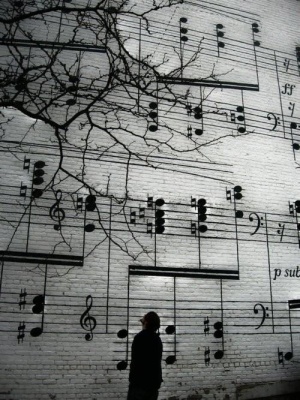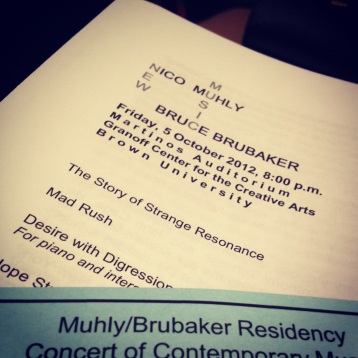It begins, as most things begin, with a song.
 The idea of music’s power is deeply ingrained into daily living, from ideas about what we get from the musical experience, to fears about its pervasiveness, to our creation myths. I’m somewhat obsessed with the idea of a sung creation myth, where it is not merely the words that “speak” everything into being, but the tune. Think John Milton’s 1632 “At a Solemn Music”, where the idea of being “in tune” with God and with nature is central to the poem. Let everything that has breath praise… musically. The idea of harmony that is present on an eternal sphere as well as an earthly one — and the idea that we must “answer that melodious voice” with “undiscording voice”. The idea that harmony is where things began, where things were in “perfect diapason” “in first obedience.” Being attuned to God and his purpose is like being “in tune” with a consort.
The idea of music’s power is deeply ingrained into daily living, from ideas about what we get from the musical experience, to fears about its pervasiveness, to our creation myths. I’m somewhat obsessed with the idea of a sung creation myth, where it is not merely the words that “speak” everything into being, but the tune. Think John Milton’s 1632 “At a Solemn Music”, where the idea of being “in tune” with God and with nature is central to the poem. Let everything that has breath praise… musically. The idea of harmony that is present on an eternal sphere as well as an earthly one — and the idea that we must “answer that melodious voice” with “undiscording voice”. The idea that harmony is where things began, where things were in “perfect diapason” “in first obedience.” Being attuned to God and his purpose is like being “in tune” with a consort.
Or John Dryden’s “A Song for St. Cecilia’s Day” (1687) about 50 years later, where the first stanza reiterates similar ideas of harmony and Creation:
From harmony, from heavenly harmony
This universal frame began:
When nature underneath a heap
Of jarring atoms lay,
And could not heave her head…
Harmony stands for order. The atoms and “cold, and hot, and moist, and dry” obey music’s power. It is through this harmony that the world comes into being — more so than a spoken voice, or the Word. The diapason is present too, and closes in on Man.
 Another more recent example is Tolkien’s Silmarillion, where the same principle of “ordering” music that creates existence is at work. Iluvatar introduces a “Great Theme”, and the Ainur take up this theme, and expand it (or develop it) through their voices, harps and lutes, and other instruments. The music is so powerful that “the places of the dwelling of Iluvatar were filled to overflowing, and the music and the echo of the music went out into the Void, and it was not void.” Eventually, as in Milton’s poem, Melkor introduces a different theme, a subversive and “discordant” one that vies for power against the original Great Theme. Discordance is equated to sin and disobedience, just as harmony stands for union with the Maker and his plan.
Another more recent example is Tolkien’s Silmarillion, where the same principle of “ordering” music that creates existence is at work. Iluvatar introduces a “Great Theme”, and the Ainur take up this theme, and expand it (or develop it) through their voices, harps and lutes, and other instruments. The music is so powerful that “the places of the dwelling of Iluvatar were filled to overflowing, and the music and the echo of the music went out into the Void, and it was not void.” Eventually, as in Milton’s poem, Melkor introduces a different theme, a subversive and “discordant” one that vies for power against the original Great Theme. Discordance is equated to sin and disobedience, just as harmony stands for union with the Maker and his plan.
Neil Gaiman’s Anansi Boys (2005) begins with song, a nod to the creation myths of Africa as well as Milton’s. “In the beginning, after all, were the words, and they came with a tune. That was how the world was made how the void was divided, how the lands and the stars and the dreams and the little gods and the animals, how all of them came into the world.” In the beginning was the Word. But it is not the Word alone that excites — it is the tune that accompanies it that adds to its power.
The power is not just in what is being said, but also in how it sounds.